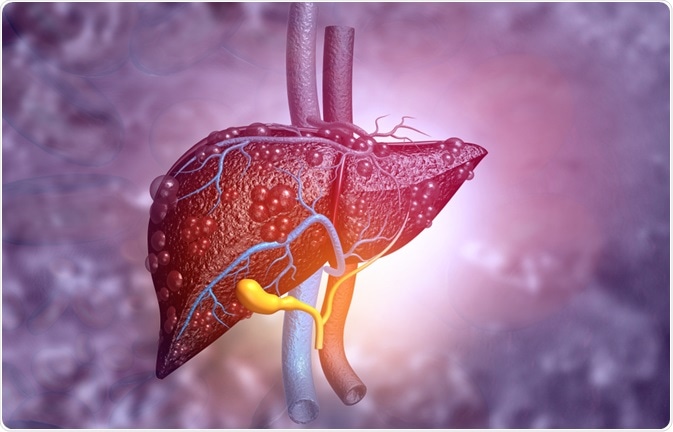The treatment of liver cancer aims to eliminate cancer, slow cancer growth, improve patient survival, and/or manage symptoms. The choice of treatment depends on several factors:
- The spread of cancer within the liver
- Metastasis of the cancer to other organs
- The patient’s overall condition and treatment preference
- The status of the remaining cancer-free area of the liver

Image Credit: Explode / Shutterstock.com
Surgery
The surgical treatment for liver cancer will typically involve the removal of the tumor as well as some surrounding healthy tissue. This treatment option is used particularly in patients with a tumor that is smaller than 5 centimeters (cm) and is solely present in the liver.
Two types of surgery are used to treat hepatocellular carcinoma (HCC), of which include hepatectomy or a liver transplant.
Hepatectomy
A hepatectomy is when a portion of the liver with the cancer is resected. The remaining healthy section of the liver then takes over the functions of the entire organ. It is even possible that the liver may regrow to its normal size within weeks.
Regardless of tumor size, a hepatectomy may not be an option if the patient has advanced cirrhosis. Some of the side effects of a hepatectomy may include pain, weakness, fatigue, bleeding, infection, and/or liver failure.
Liver transplantation
Patients must fulfil very specific criteria in terms of tumor size and number to qualify for this. Due to the limited number of donor livers available transplantation is not always possible.
After a transplant, rejection of the new liver is a real likelihood therefore the patient must take medication to prevent this.
Percutaneous ethanol injection
A percutaneous ethanol injection will involve the direct injection of alcohol into the tumor. This is a generally simple and safe procedure that has been found to be particularly effective in destroying tumors smaller than 3 cm. Some of the side effects of this treatment option can include fever and pain after the procedure.
Radiofrequency ablation
Radiofrequency ablation can involve the passage of either radiowaves or high-intensity laser light through a needle that is inserted into the tumor. Radiofrequency ablation has largely replaced ethanol injection.
Chemoembolization
Chemoembolization involves the injection of drugs that are in an oily immersion into the hepatic artery that is supplying the tumor with blood. The drug-oil solution allows the chemotherapeutic agents to remain in the liver for long enough to destroy the cancer cells. This is the primary treatment for HCC, but may also be used to slow tumor growth as patients awaiting a liver transplant.

Image Credit: Rido / Shutterstock.com
Radiation therapy
Radiation therapy utilizes high-energy radiation to destroy cancer cells. During radiation treatment, certain masures are taken to protect the other organs from radiation exposure and any unwanted side effects from the treatment, such as damage to the stomach and lungs.
There are two types of radiation therapy used to address cholangiocarcinoma and HCC which include stereotactic body radiation therapy (SBRT) and radioembolization.
SBRT
SBRT delivers high doses of radiation to a tumor that is smaller than 5cm while simultaneously limiting the amount of radiation that can reach and potentially damage healthy tissues.
Radioembolization
Radioembolization involves strategically placing radioactive beads into the small blood vessels that is responsible for supplying the tumor with blood. When these beads become trapped in these vessels, they also deliver radiation directly into the tumor to halt its growth.
Targeted therapy
Targeted therapy addresses the specific and individual genes that contribute to the growth and survival of different forms of cancers. This allows the design of effective and more personalized treatments.
Anti-angiogenesis drugs are the most common example of targeted therapy for HCC. These drugs act by inhibiting angiogenesis, which is the formation of new blood vessels, to essentially “starve” the tumor of nutrition.
For example, Sorafenib is a pill that can be used in the treatment of advanced HCC that cannot be entirely removed by surgery. The side effects of this therapy include diarrhea and certain skin problems.
Chemotherapy
By definition, chemotherapy involves the use of chemical substances to stop the growth, division, and spread of cancer cells.
Systemic chemotherapy involves the administration of one or a combination of drugs into the bloodstream to reach the cancer cells. Chemotherapeutic agents are typically administered through an intravenous injection and given in a specific number of cycles over a set period of time. While chemotherapy is often incorporated into many types of cancer treatment protocols, it is not commonly used for HCC.
The side effects of chemotherapy vary with each individual and dosage; however, some of the more common symptoms can include but are not limited to, nausea, vomiting, hair loss, loss of appetite, fatigue, low blood cell count, bleeding or bruising after superficial cuts or injuries, as well as numbness and tingling of extremities. These symptoms usually stop once treatment is concluded.
Palliative Care
Palliative care aims to reduce the symptoms and side effects of treatment to improve the patient's quality of life. Palliative care can involve a combination of medications, dietary changes, relaxation techniques, emotional support, and other therapies.
References
Further Reading
Last Updated: May 18, 2023